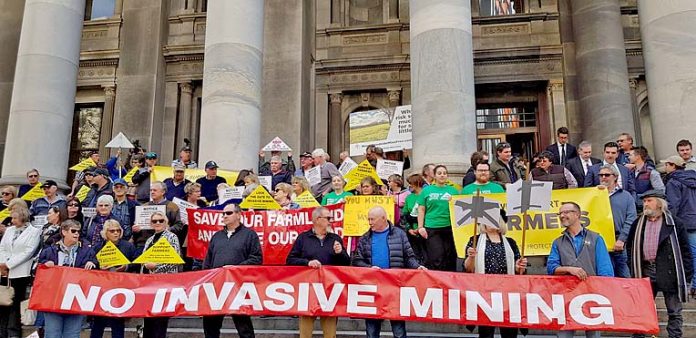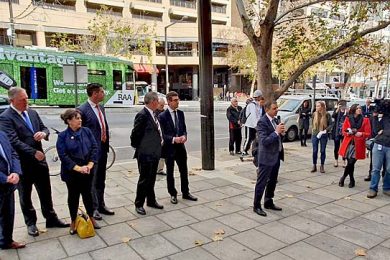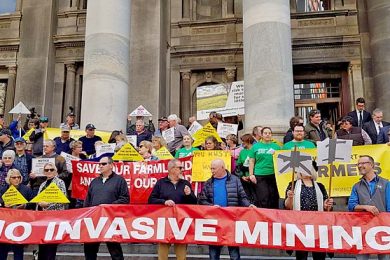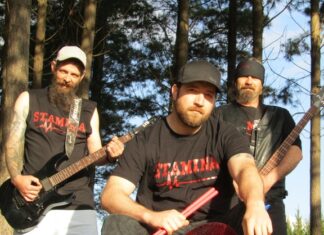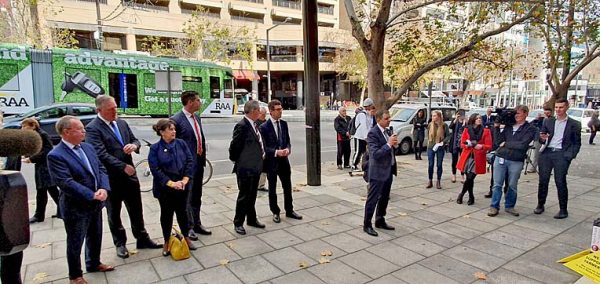
MOUNT Gambier MP Troy Bell will back an independent inquiry into mining land access after the State Government’s controversial Mining Act was passed in State Parliament last night.
Regional crossbench parliamentarian Geoff Brock indicated he will seek support for an independent review to thoroughly examine best land access frameworks used in other jurisdictions.
Mr Brock said the notice of motion, which was seconded by Mr Bell, aimed to provide clarity to the mining bill which is currently causing “division and concern”.
“There is support for this motion from peak industry bodies, including the Grain Producers SA and the South Australian Chamber of Mines and Energy who jointly called for an independent review into the state’s mining legislation earlier this year,” he said.
“I believe it is essential we protect our farmers and their industry and listen to their concerns about the lack of protection of South Australian arable land, which is reducing every year.”
Mr Brock, Mr Bell and the House of Assembly’s third independent MP Frances Bedford were joined on the crossbench by four Liberal MPs, including Nick McBride, in voting down the State Government’s contentious bill on Wednesday.
For the second time in 18 months, Mr McBride and former Liberal Party state president Steve Murray, Yorke Peninsula MP Fraser Ellis and Adelaide Hills MP Dan Cregan defected to the crossbench to object to the bill.
Since the bill’s introduction in the lower house last year, the bloc of country first-term Liberals have been vocal in their opposition to what they perceive as a lack of community consultation between the government, farmers and the mining industry.
The group crossed the floor in November to delay a final vote on the mining act until February and hoped to secure a period of consultation with key stakeholders.
Mr McBride said the groups’ intention for a new mining act benefiting both the mining and agricultural industries did not eventuate.
“We would have liked to the bill open for debate and cross-examination,” he said.
“I would have added an independent judicial inquiry into the Mining Act or an independent review of the Mining Act.
“I do not believe the government has appropriately consulted on this bill.”
Mining Minister Dan van Holst Pellekaan rejected Mr McBride’s comments, saying the bill has been the subject of extensive consultation with both the farming and mining sectors since the election of the Liberal Government.
But Limestone Coast Protection Alliance chair Angus Ralton, who spoke at a rally at the steps of Parliament House ahead of the debate, squared off at the government’s “broad scale assault” on the state’s agricultural industry.
“The fact the government has moved the amendments without informing the local regional communities smacks of arrogance,” he said.
“They are pushing ahead with the mining bill without considering the concerns of the agricultural industry.
“We are not asking for much, we are asking for a truly independent review of the act and legislated protection in agricultural areas from resource companies.”
Although the bill has passed the lower house with Labor and majority Liberal support, it will progress to the state’s upper house to be voted on a second time.
Greens MLC Mark Parnell said he would introduce amendments in consultation with farming communities, but flagged a stronger focus on the rights of landholders and communities in approving proposed mining activities.
“If a landholder agrees to allow mining on their land, there should be a process for other affected people in that community to comment on the proposal,” he said.
“The effects of mining on the community by way of traffic, dust, groundwater go beyond the borders of the landowner.
“To focus entirely on the rights of landholders is, I think, missing a big part of the story.”

